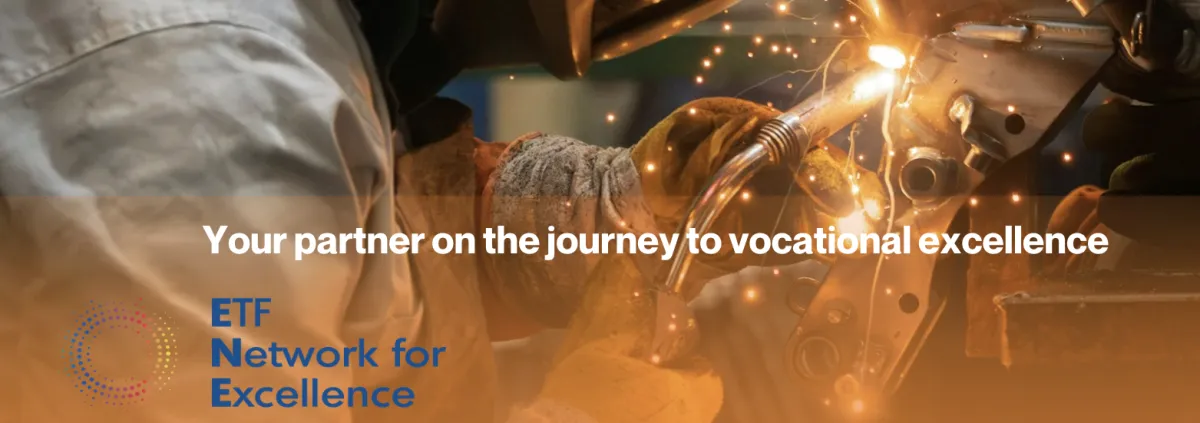
What is ENE?
The ETF Network for Excellence (ENE) is a global community of Centres of Vocational Excellence (CoVEs), VET providers, and cooperation partners working together to transform vocational education and training (VET).
Since 2020, ENE has been helping institutions build partnerships, share best practices, and shape policies that drive skills development and system-wide reform.
Currently with more than 330 members from more than 50 countries.
Welcome and highlights from ETF Network for Excellence (ENE)
What is Vocational Excellence?
Vocational excellence is about delivering high-quality, future-focused training that equips individuals with the skills, mindset, and adaptability needed in a changing world of work. It ensures VET is not just about technical skills but also about innovation, sustainability, and inclusion.
A strong vocational excellence system:
✔ Meets industry needs – Training people with the right skills for the labour market.
✔ Drives innovation – Fostering entrepreneurship, new technologies, and creative problem-solving.
✔ Supports lifelong learning – Helping individuals upskill and reskill throughout their careers.
✔ Strengthens communities – Boosting local and regional economic development.
✔ Champions inclusion – Ensuring access for all, regardless of background.
CoVEs: Engines for VET Reform
At the heart of ENE are Centres of Vocational Excellence (CoVEs) —leading institutions that drive innovation, partnerships, and policy change in VET. CoVEs work within skills ecosystems, connecting education, industry, and policymakers to ensure VET is aligned with economic and social needs.
CoVEs act as:
🏭 Bridges between education and industry – Ensuring training matches workforce demands.
🚀 Innovation hubs – Developing cutting-edge solutions for skills development.
🤝 Collaboration platforms – Bringing together businesses, universities, and policymakers.
ENE empowers VET providers and CoVEs through:
✅ Partnerships – Connecting VET institutions, industries, and policymakers.
✅ Peer learning – Sharing knowledge and best practices across regions.
✅ Policy advance – Helping countries strengthen and reform their VET systems.
ENE focuses on key areas shaping the future of skills:
🌱 Green Transition – Preparing learners for sustainable jobs
📱 Digital Education – Integrating digital tools and skills into training
🚀 Entrepreneurship – Equipping learners with business and leadership skills
🤝 Social Inclusion – Ensuring equal access to high-quality training
🌍 Regional Collaboration – Including initiatives like ENE Africa to strengthen vocational excellence
📜 Policy Advancement – Supporting governments to improve VET systems and strategies
ENE closed initiatives can be found here: Autonomy and public-private partnerships in CoVEs, Vocational Excellence and work-based learning.
Welcome to ENE Atlas — your map to the ENE community 🌍
ENE Atlas is a new tool created for the ENE community to help you get to know the network better — who’s doing what and how we can learn and work together.
With ENE Atlas, you can:
- discover peers across the network,
- make your work and expertise more visible,
- find inspiration (good practices) and new opportunities for collaboration.
The Atlas will grow and evolve with the network, so it’s not just a directory, but a living map of ENE knowledge and connections. We hope it becomes a useful and enjoyable tool for staying connected and exploring new paths together.
For ENE Members: What’s Coming Up
- ENE Webinar "Investing in skills: smart financing models for CoVEs", 28 April 2026
- DIGI ENE Online Event: “Exploring the pedagogical use of Artificial Intelligence”, 2 December 2025.
- Global TVET Forum 2025, October 28-30, 2025
- Webinar “Bridging the Gap: How Industry and Vocational Education Co-Create the Future of Learning” on Tuesday, November 11, 2025
ENE Newsletter
Join ENE & Shape the Future of Skills
ENE is open to VET providers, CoVEs, and cooperation partners who want to drive change, gain expertise, and connect with leading institutions worldwide. Please find a step-by-step guide: How to join the ETF Network for Excellence (ENE)
👉 For more information about ENE, please write to: etf.network.for.excellence@etf.europa.eu
👉 Privacy statement for ENE members

Please log in or sign up to comment.